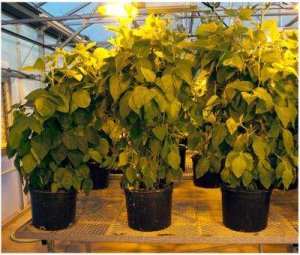
The King of Beans
Soybeans are an important source of oil, protein, fiber, and vitamins. Worldwide consumption of soybeans amounts to nearly 11 million tons, with almost 75 percent going into feed for livestock. The “king of beans” is incredibly valuable to food security.
Now, Washington State University biologist Mechthild Tegeder has designed a way to increase the plant produce, yielding up to 36 percent more seeds. Tegeder and Amanda Carter, a biological sciences graduate student, developed a way improve the soybean plants by adding proteins that increase the flow of nitrogen to its seed-producing organs.

Traditional plants rely on usable nitrogen already in the soil, or imparted by artificial fertilizers. Legumes, like the soybean, have a natural way of furthering nitrogen flow: they contain nitrogen-fixing rhizobia bacteroids in their root nodules. Tegeder increased the proteins that transport nitrogen from rhizobia to the other parts of the plant.
There was an overall improvement in the soybean plant, reported Tegeder. “They are bigger, grow faster and generally look better than natural soybean plants,” Tegeder said. “Some evidence we have suggests they might also be highly efficient under stressful conditions like drought.”
Feeding the World
“The biggest implication of our research is that, by ramping up the natural nitrogen allocation process, we can increase the amount of food we produce without contributing to further agricultural pollution,” Tegeder said. “Eventually we would like to transfer what we have learned to other legumes and plants that humans grow for food.”
More than 795 million people in the world do not have access to sufficient and nutritious food. To feed the world is a massive sociopolitical responsibility, and will take strides from many government organizations, academicians, and corporate industries. A revolution in farming, transportation, food processing, and even pricing and distribution is also necessary.
While amping up soybean production—or in general, increasing the agricultural output—isn’t the ultimate answer to food security, it’s a great step towards it.
Plus, it’s good news for soy milk and tofu lovers.